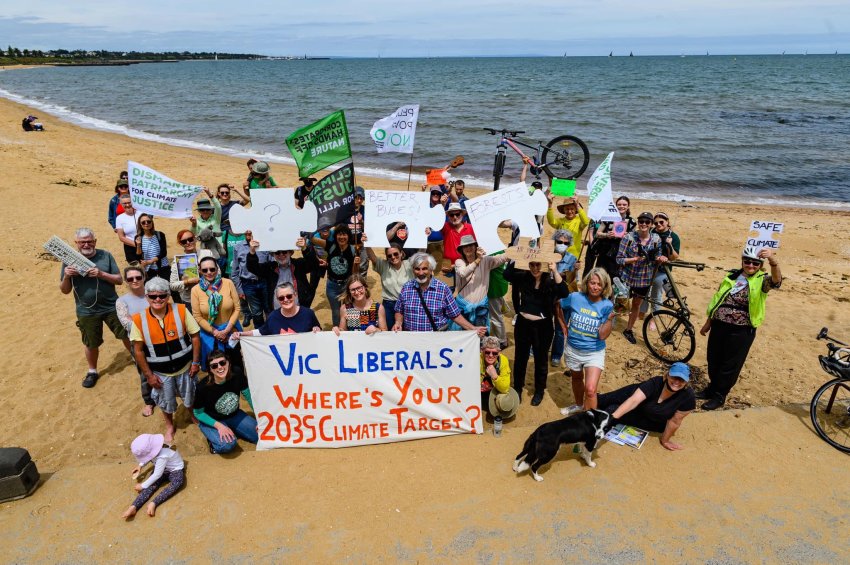
Community frustration with many years of climate inaction delivered a wave of climate independents, the strongest ever vote for the Greens and the election of a federal Labor government in May.
Domestic concerns were expected to dominate Victoria’s election in November, and while many issues were raised across the state, cost of living rises became central, as was Victorian Labor’s handling of the pandemic.
Climate change, energy and forests figured strongly in the election campaign.
The establishment media projected the Andrews government would lose, or become a minority government. What has transpired is largely in line with the polling: Labor has been returned with a healthy majority and the Greens retained Melbourne, Prahran and Brunswick and won Richmond and are close in Northcote. It looks like a progressive Legislative Council will be controlled by Labor, Greens, Legalise Cannabis and Animal Justice.
Given that the rising cost of energy is a major concern for so many, the Liberals picked a strange hill to die on by former Liberal leader Matthew Guy pledging to "turbo charge” gas production while ignoring Victoria’s limited gas reserves and fudging whether they would lift the ban on fracking.
Even the government’s Victorian Gas Plan notes the amount of conventional gas available is “unlikely to reduce the price of gas for Victorians”.
Guy ignored other more sensible measures and also neglected to announce a greenhouse gas emissions target for 2035.
While Labor said it would raise renewable energy targets to 65% by 2030 and 95% by 2035, the Liberals did not give any commitment to renewable energy targets.
After the Liberals’ last term in government, where wind energy was effectively banned across much of the state and the climate policy infrastructure, such as Emission Reduction Targets were largely demolished, it was hard to believe the Liberals had changed. In addition, Guy declared he would stop more investment in the Suburban Rail Loop, the biggest transport infrastructure project in the state’s history. Given that large public transport infrastructure like the Metro Tunnel is well supported, this seemed like a significant misjudgement.
The Greens and Labor ran hard on projecting real action on the climate to reduce energy prices and deliver economic benefits to the regions.
Andrews spoke about renewable energy and jobs in his victory speech, highlighting that “climate action equals jobs”. Both parties argued for deep emission reduction targets — Labor promised to cut greenhouse by 75-80% by 2030 and the Greens promised net zero emissions by 2035.
Labor also promised to get the government back into energy production, announcing Labor would re-establish the State Electricity Commission (SEC).
Andrews described this as Victoria’s “most significant energy announcement” for 30 years. It includes $1 billion to deliver 4.5 gigawatts of renewable energy capacity, to be majority owned by the state and run by the SEC.
Since the Liberal Jeff Kennett government privatised the SEC in the 1990s, energy supply has been in corporate hands. While the community-owned Hepburn wind farm is an inspiring example of what the future energy system might look like, much of the new investment in renewables still comes from transnational corporations and distant shareholders.
Getting the government back in the game on energy ownership is good policy and appears to have been widely welcomed. After decades of neoliberal ideology ruling economies and government around the world, many are seeing that outsourcing, smaller government, the privatisation of public assets and the gig economy does not benefit the majority. Rebuilding the SEC is a significant moment for Victoria.
However, protecting native forests remains a problem. Forest campaigners’ campaigns in the inner city seats of Northcote and Richmond did have a significant impact. Labor’s plan to end native forest logging by 2030 was correctly criticised for being too late, as was the Coalition’s promise to tear up the forest transition plan and maintain logging indefinitely.
The 2019-20 Black Summer fires reminded us that native forests need protecting. It also showed that there simply isn’t enough forest left to continue logging at current levels until 2030.
Protecting forests is an important part of the climate solution: they store enormous amounts of carbon, especially in the Mountain Ash forests to the east of Melbourne. Logging releases about 3 megatonnes of pollution a year — the same as 700,000 cars on roads.
Stopping logging in the next two years would be one of the best ways for Victoria to meet its climate targets.
Labor has signaled it will phase out coal and put into place policies and the development of renewable energy to achieve it. It will be an enormous task to ensure an unprecedented build-up of renewables, while ensuring there is a social licence for the projects and associated infrastructure such as power lines.
If Labor delivers on its climate commitments, we will transition into a new economy where the sun and wind power our state and Victoria becomes a national and global leader on climate action.
[Cam Walker is the Campaigns Coordinator for Friends of the Earth, Victoria.]